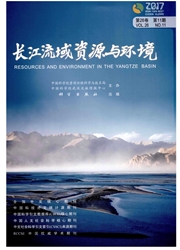

 中文摘要:
中文摘要:
碳排放量、能源消费量和经济增长间存在着密切的关系。长三角地区(研究该区域为上海、浙江、江苏,简称长三角,下同)碳减排措施的实施是否会影响长三角地区的经济增长,能源消费量、能源结构和碳排放量间存在何种联系,这些均是在长三角碳减排政策制定中亟待考虑的问题。利用1990~2010年,长三角的能源经济样本数据,使用ARDI,模型和格兰杰因果检验模型(Granger)定量的研究了上述几个因素之间的关系。研究发现:当碳排放量、能源消费和经济增长分别为回归变量时,均存在其它解释变量和每个回归变量间的长期稳定的协整关系。在长期关系中,存在经济增长对碳排放量的负向弹性影响。能源消费对经济增长的影响为正,能源消费每增长1%,经济增长0.67%。碳排放量对经济增长的长期影响为负,碳排放量每增长1%,经济则减少0.49%。Granger因果关系的研究表明:滞后长度分别为3,4时,存在从经济增长到能源消费和碳排放量倒的单向因果关系。不存在从能源消费和碳排放量到经济增长的单向因果关系,且亦不存在碳排放量和能源消费的双向因果关系。在长三角,制定和实施适当的节能减排政策将不会阻碍该地区经济增长。节能减排政策的制定,应首先考虑能源结构优化,降低长三角高碳能源的消费比重。
 英文摘要:
英文摘要:
There is a close relationship between carbon emissions, energy consumption and economic growth. Whether implementation of carbon emission reduction measures will affect the economic growth in the Yangtze River Delta region and what kind of relationship among energy consumption, energy structure and carbon emissions are the urgent problem which are thought about in making the carbon emission reduction policies in the develop- ment of the Yangtze River Delta region. This paper examinesd the casual relationship between carbon emissions, en- ergy consumption and economic growth using the ARDL model and Granger causality test model in the Yangtze River Delta region (Shanghai, Zhejiang, Jiangsu) during 1990 -- 2010. The results indicated that when the carbon e- missions, energy consumption and economic growth were the regression variables, respectively, there were the long- term stability cointegration relationship between other explanatory variables and each regression variable. In the long-term relationship,there was the negative impact on carbon emissions from economic growth. The impact of en- ergy consumption on economic growth was positive. The impact of energy consumption on economic growth was around 0. 67 and statistically significant at 1% level,meaning that 1% increase in energy consumption would result in 0. 67% increase in economic growth. The long-run impact of carbon emission on economic growth was negative. The impact of carbon emission on economic growth was around 0.49 and statistically significant at 1 % level, mean- ing that 1% increase in carbon emission would result in 0.49 % decrease in economic growth. Both in long-run and short-run relationship,the impact of energy consumption on carbon emissions was positive and significant at 1 % level. This indicated that the proportion of high-carbon energy consumption reduction and the reduction of energy consumption would contribute to achieve the carbon reduction goals in the Yangtze River Delta region. When ener- gy consumption was a regression vari
 同期刊论文项目
同期刊论文项目
 同项目期刊论文
同项目期刊论文
 期刊信息
期刊信息
